InAsia
Insights and Analysis
Pelita Padang: Building Tolerance in an Era of Polarization
October 11, 2023

Chap Goh Mei, the annual Lantern Festival of the Chinese-Indonesian community, which was banned under the Suharto regime. (Photo: Rudolf Klavert / The Asia Foundation)
One of the world’s most diverse countries, with thousands of ethnic groups and multiple state-sanctioned religions, Indonesia’s path to democracy since the end of the authoritarian Suharto regime in 1998 has held out the promise of fundamental rights for all citizens. Yet key tenets of democracy—freedom of expression, association, and political participation—have not always protected the rights of disfavored minorities, and instead have been exploited by conservative groups to dictate social values and to decree what is acceptable in the religious, political, and private spheres.
The government of Indonesia and civil society actors concerned with religious freedom have grown increasingly alarmed by the spread of radical religious views that promote discrimination against groups and individuals considered “unacceptable,” including both followers of minority religions and nonconformists of accepted faiths. Steadily growing reports of violence against minority religions have tracked the gradual spread of these radical ideas, dramatically escalating levels of religious conflict across the country.
Tolerance and intolerance in Indonesia
Two national laws allow discrimination against minority religions: the Blasphemy Law of 1965 and the Religious Harmony Regulation, adopted under President Susilo Bambang Yudhoyono in 2006. The latter strengthened the Blasphemy Law and added weight to many of its oppressive regulations. The SETARA Institute for Democracy and Peace, an Indonesian nonprofit, has found that from 2007 to 2022 there were 573 episodes of religious intolerance directed towards places of worship, from refusal of permission to worship and refusal to grant permits for places of worship, to intimidation of minority believers and other forms of intolerance.
New laws and regulations by themselves cannot effectively address this problem of radicalization and intolerance. What is needed, rather, is the reinforcement of social values and practices that are known to reduce intolerance, while working with communities and various government agencies and officials to create a supportive environment for minorities.
The rise of identity politics
In late 2016 and early 2017, many observers were shocked to see that a conservative strain of “muscular” Islam that had largely been confined to the fringes was beginning to dominate public debate. Several studies found that these radical views were being propagated through schools, universities, and mosques in addition to online and social media.
Indonesian elections have witnessed a corresponding rise of religious identity politics. Without strong support from the political grassroots, politicians are instead invoking religious allegiances, exploiting radical and exclusionary religious views as they work with conservative groups. This, in turn, is affecting the way different communities relate to each other.
To identify with a group is part of human nature. Once people connect with a group, their identities can become powerfully bound to it. When such a group feels threatened, they can become deeply defensive, and when the unity of an identity group is based on the existence of a perceived enemy, identity politics can create deep and even violent social polarization. By tapping into this powerful element of human nature, the discourse of religious intolerance threatens democracy with a zero-sum logic of us-versus-them. The health of Indonesia’s hard-won democracy requires an antidote to the rising fever of religion-fueled identity politics. Defusing the antagonism between religious identity groups is the only way to deal with Indonesia’s deepening polarization and religious division.
Fostering interfaith dialogue: the Pelita Padang story
In the city of Padang, the capital of West Sumatra, which the Setara Institute ranked third from the bottom in tolerance out of 94 Indonesian cities in 2022, two young women, Angelique Maria Cuaca and Silmi Novita, set out to bridge the chasm between young people from different religious backgrounds. They created an interfaith youth organization called Pelita Padang, in 2019, to promote dialogue across religious communities.
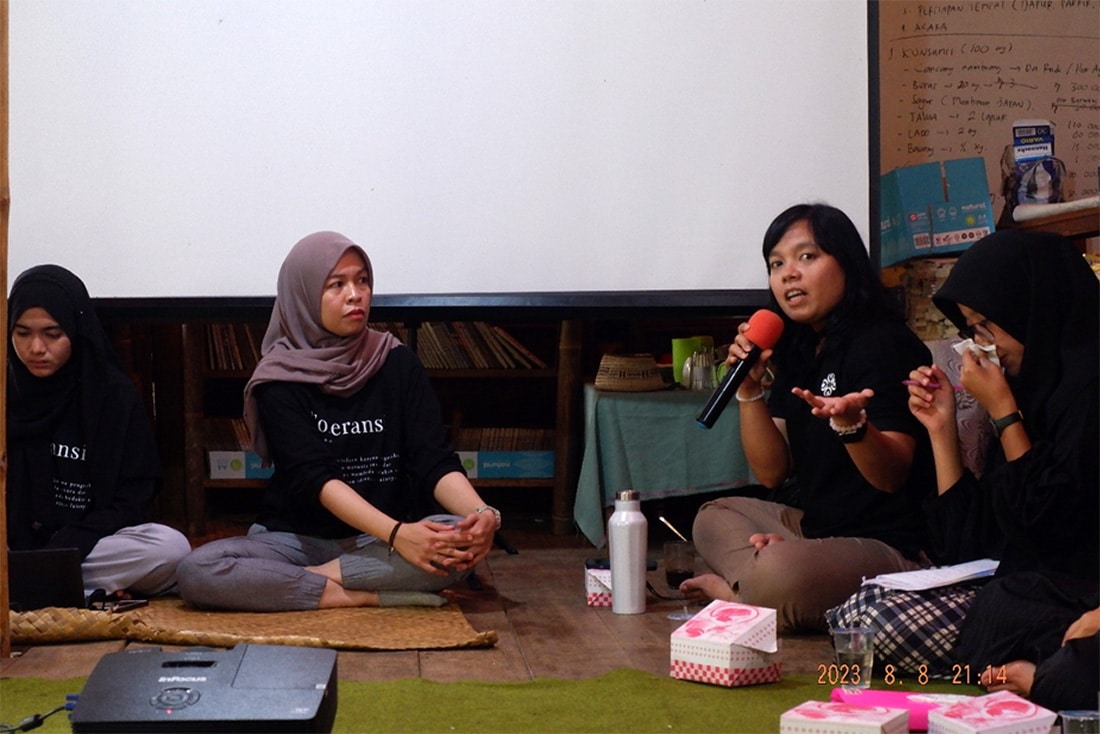
A meeting of PELITA Padang. (Photo: The Asia Foundation)
Pelita Padang is a group of young people with an aspiration to break free from the entanglements of past religious conflicts. It was born from the anxiety they felt over the increasing problem of intolerance in Indonesia, especially in West Sumatra. Informal meetings are held regularly and include speakers to discuss various topics such as Indonesians’ constitutional right to worship and the root causes of religious conflict and cultural clashes.
With support from The Asia Foundation, Pelita Padang often holds interfaith dialogues, film discussions, and writing competitions, mainly focusing on religious diversity. It also works actively on issues with other organizations. When Covid-19 hit, Pelita Padang collaborated with one of the oldest Chinese associations in Padang to organize a mass vaccination event. Together with a local community group, they also supported Chap Goh Mei, the annual Lantern Festival of the Chinese-Indonesian community, which was banned under the Suharto “New Order” regime.
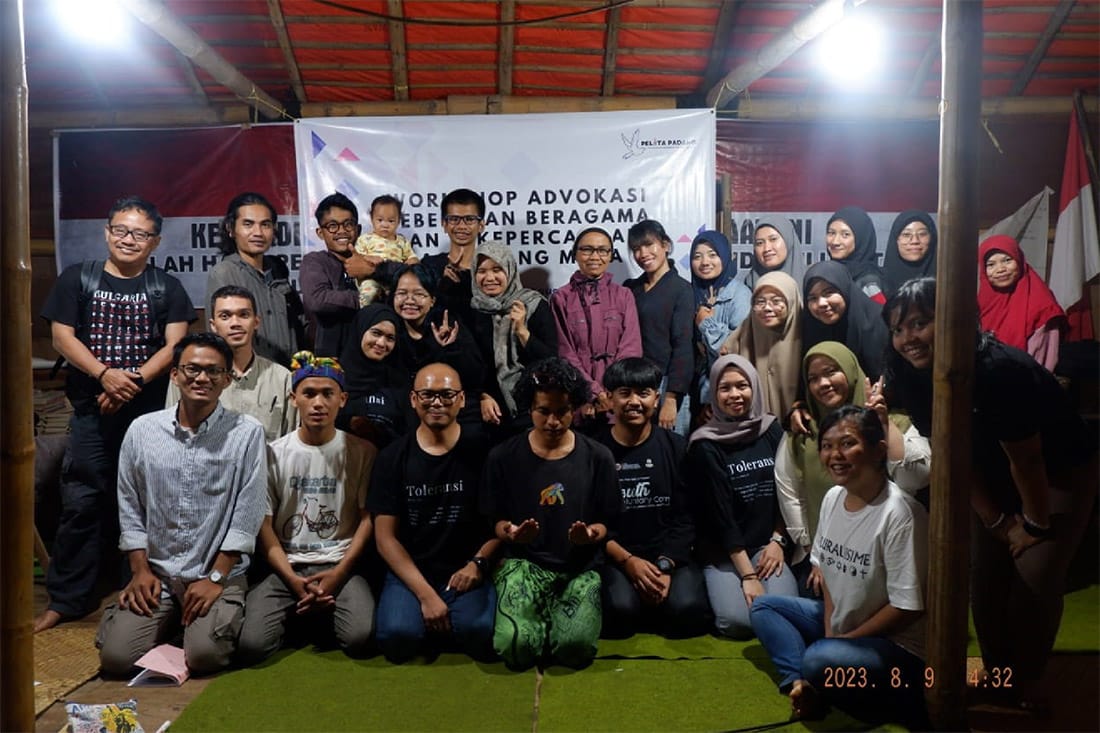
PELITA Padang activists posing with The Asia Foundation’s Democracy and Governance team after a workshop on advocacy for freedom of religion and belief. (Photo: The Asia Foundation)
Community support and participation can help people heal from the trauma of discrimination. Pelita Padang believes intergroup communication can be achieved in these smaller dialogues where people can set aside biases and embrace differences with compassion and understanding on a more personal level.
Pelita Padang aims to increase youth awareness and participation in freedom of religion and belief issues in West Sumatra. We hope active youth participation can help build a tolerant community more appreciative of differences in faith and culture.
— Angelique Maria Cuaca of Pelita Padang
The idea is to create friendships across faiths to break down barriers and stigma. This will ultimately lead to tolerance and inclusivity. Religious tolerance is the underlying theme of Indonesian democracy, and a more tolerant future for the world’s third-largest democracy depends on its ability to build inclusive communities.
A. Jamet Hamidi is a program officer in The Asia Foundation’s Democracy and Governance program in Indonesia. He can be reached at [email protected]. The views and opinions expressed here are those of the author, not those of The Asia Foundation.
About our blog, InAsia
InAsia is posted and distributed every other Wednesday evening, Pacific Time. If you have any questions, please send an email to [email protected].
Contact
For questions about InAsia, or for our cross-post and re-use policy, please send an email to [email protected].The Asia Foundation
465 California St., 9th Floor
San Francisco, CA 94104
The Latest Across Asia
News
April 25, 2024
Program Snapshot
April 18, 2024
News
April 17, 2024

2024 Lotus Leadership Awards
The Lotus Leadership Awards recognize contributions towards gender equality in Asia and the Pacific

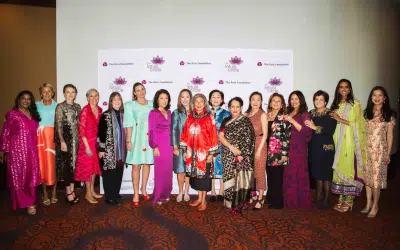
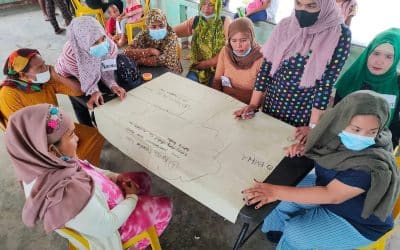
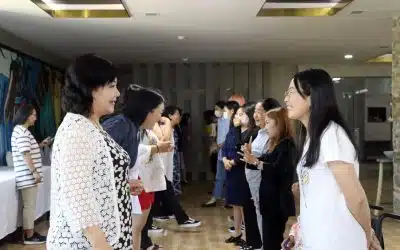



0 Comments